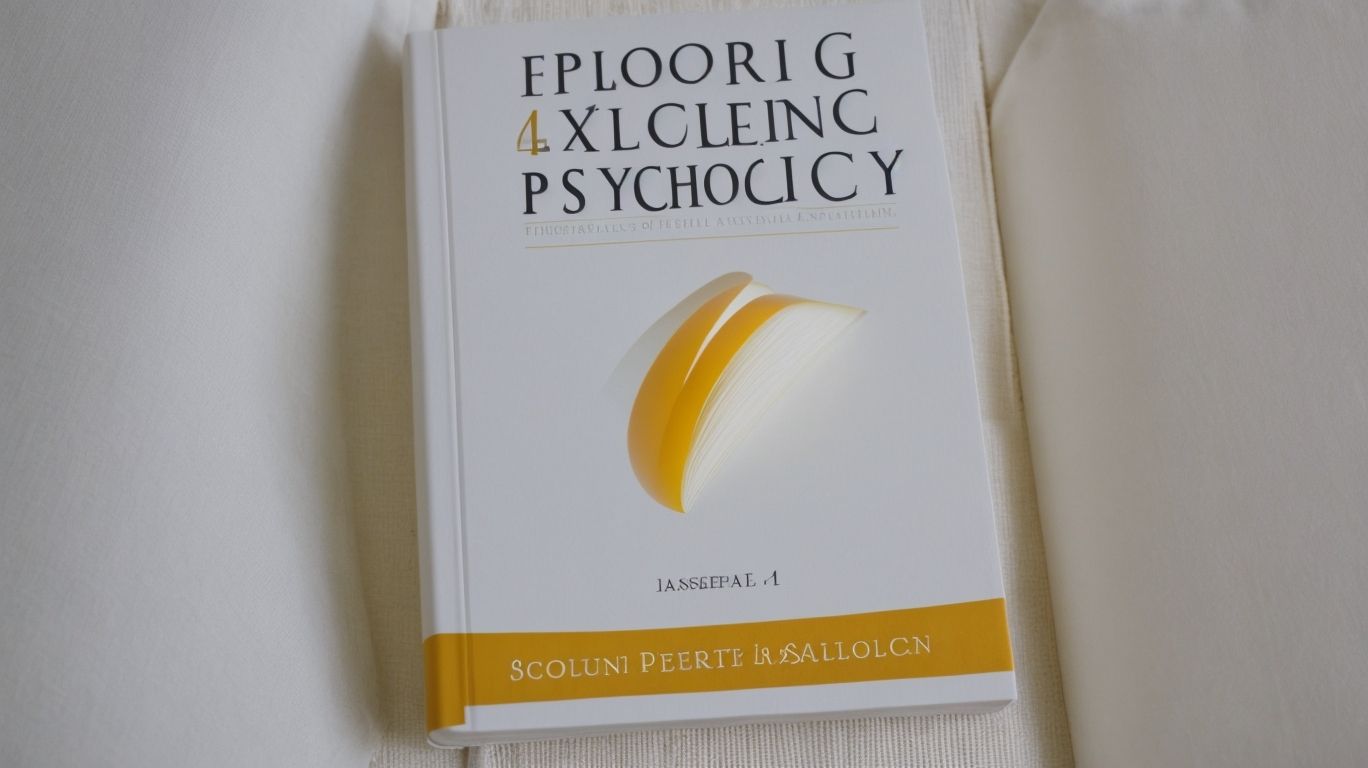Have you ever wondered what psychology is all about? What are the main topics covered in exploring psychology?
The purpose of exploring psychology is to provide readers with an in-depth understanding of the biological basis of behavior, sensation and perception, states of consciousness, learning and conditioning, memory, cognition and language, and much more. In this article, we will explore the main topics covered in Exploring Psychology: A Comprehensive Analysis (4th Edition) to give you a glimpse of what to expect from this comprehensive guide. So, let’s dive in and unravel the fascinating world of psychology!
Contents
- 1 Key Takeaways:
- 2 What Is Exploring Psychology?
- 3 What Is the Purpose of Exploring Psychology?
- 4 What Are the Main Topics Covered in Exploring Psychology?
- 4.1 Introduction to Psychology
- 4.2 Biological Basis of Behavior
- 4.3 Sensation and Perception
- 4.4 States of Consciousness
- 4.5 Learning and Conditioning
- 4.6 Memory
- 4.7 Cognition and Language
- 4.8 Intelligence and Intelligence Testing
- 4.9 Motivation and Emotion
- 4.10 Development Across the Lifespan
- 4.11 Personality
- 4.12 Social Psychology
- 4.13 Psychological Disorders
- 4.14 Treatment of Psychological Disorders
- 4.15 Stress, Health, and Coping
- 5 Frequently Asked Questions
- 5.1 1) What is the main focus of ‘Exploring Psychology: A Comprehensive Analysis (4th Edition)’?
- 5.2 2) How is the 4th edition different from previous editions of ‘Exploring Psychology: A Comprehensive Analysis’?
- 5.3 3) Who is the author of ‘Exploring Psychology: A Comprehensive Analysis (4th Edition)’?
- 5.4 4) How does ‘Exploring Psychology: A Comprehensive Analysis (4th Edition)’ cover the various subfields of psychology?
- 5.5 5) Is ‘Exploring Psychology: A Comprehensive Analysis (4th Edition)’ suitable for both undergraduate and graduate level students?
- 5.6 6) What resources are included with ‘Exploring Psychology: A Comprehensive Analysis (4th Edition)’?
Key Takeaways:
What Is Exploring Psychology?
Exploring Psychology, authored by David G. Myers, Elizabeth Yost Hammer, and C. Nathan DeWall, is a comprehensive textbook designed for AP® Psychology courses, providing an interconnected platform for learning and understanding various psychological concepts.
The textbook’s purpose is to facilitate a deep comprehension of the intricacies of AP® Psychology, integrating the fundamental knowledge with real-life examples and case studies.
Its cohesive structure aids students in developing a solid foundation in psychology, enabling them to analyze and interpret human behavior and mental processes critically.
Through its engaging content, the textbook bridges theoretical concepts with practical applications, emphasizing the educators’ commitment to ensuring a holistic learning experience for students exploring the realms of psychology.
What Is the Purpose of Exploring Psychology?
The purpose of Exploring Psychology is to facilitate the in-depth understanding of psychological science, concepts, and research, enabling students to engage with real-life stories, examples, and interactive lectures.
By diving into the rich landscape of psychological phenomena, Exploring Psychology aims to instill a critical appreciation for the complexities of human behavior and cognition.
It strives to foster an environment where students can actively participate in conducting research, contributing to the advancement of psychological knowledge. The program seeks to provide practical learning experiences, equipping students with the tools and skills needed to navigate the diverse contexts in which psychological principles apply.
What Are the Main Topics Covered in Exploring Psychology?
Exploring Psychology encompasses a wide range of main topics, including cognitive and social psychology, psychological disorders, therapy approaches, intelligence, sensory experiences, learning, memory, language, emotions, stress, health, and personality aspects.
Cognitive psychology delves into mental processes such as perception, attention, problem-solving, and decision-making, offering insights into how the mind operates.
Social psychology, on the other hand, studies interactions between individuals and groups, examining topics like conformity, persuasion, and prejudice.
Psychological disorders cover conditions like anxiety, depression, schizophrenia, and bipolar disorder, shedding light on their causes, symptoms, and treatments.
Therapy approaches encompass various methods including cognitive-behavioral therapy, psychoanalysis, and humanistic approaches, tailoring treatment to each individual’s needs.
Intelligence explores the nature of mental abilities, reasoning, and problem-solving, providing a framework for understanding intellect.
Sensory experiences involve perception of sights, sounds, taste, smell, and touch, offering a glimpse into the mechanisms of sensation.
Learning and memory delve into the acquisition of knowledge and retention of information, examining processes like encoding, storage, and retrieval.
Language addresses the intricate structure and function of communication, encompassing verbal and nonverbal forms of expression.
Emotions play a crucial role in human behavior, influencing motivation, decision-making, and interpersonal relationships.
Stress and health correlate psychological well-being with physical health, expounding on the effects of stress on the body and mind.
Personality aspects scrutinize individual differences in traits, behaviors, and attitudes, contributing to a comprehensive understanding of human nature.
Introduction to Psychology
The Introduction to Psychology module, authored by David G. Myers, Elizabeth Yost Hammer, and C. Nathan DeWall, lays the foundation for understanding the science of psychology, engaging students with real-life stories and illustrative examples.
Through their expertly crafted approach, the module provides an enlightening introduction to the fundamental principles of psychology. It offers insight into the human mind and behavior, diving into topics such as psychological research, cognition, perception, and individual differences. This allows students to grasp the complexities of the human psyche.
This module scrutinizes David G. Myers’s adept knowledge and extensive teaching experience. As a result, it effectively conveys complex concepts in a reader-friendly language. It serves as a stepping stone for students, nurturing their interest in psychological science and honing their analytical skills through thought-provoking discussions and thought experiments.
Biological Basis of Behavior
The Biological Basis of Behavior module in Exploring Psychology delves into the intricate mechanisms of sensory perception, learning, memory, and their impact on human behavior, providing students with a comprehensive understanding of these processes.
The module encompasses an in-depth exploration of the structure and function of the nervous system. It highlights how sensory information is received, processed, and interpreted by the brain.
It delves into the intricate processes that underlie learning and memory formation, shedding light on the neural basis of these cognitive functions. Through this comprehensive study, students gain insights into the complex interplay between biological processes and behavioral outcomes. This fosters a deeper appreciation for the intricate connections between the mind and body.
Sensation and Perception
The Sensation and Perception module within Exploring Psychology immerses students in the captivating realm of sensory experiences and perceptual mechanisms, offering a rich understanding through research and real-world examples.
Students delve into the intricate interplay between the senses and the brain, unraveling how sensory input is transformed into meaningful perceptions.
This module explores the complexities of vision, audition, taste, touch, and smell, shedding light on how the brain processes and interprets sensory information. It delves into perceptual phenomena such as illusions and hallucinations, unraveling the underlying principles shaping human perception.
Practical examples from everyday life, along with psychological studies, provide profound insight into the fundamental processes governing our sensory experiences and perceptual interpretations.
States of Consciousness
The States of Consciousness module in Exploring Psychology delves into the complexities of cognitive experiences, memory functions, and their impact on human consciousness, providing students with a profound understanding of these intricate processes.
The module addresses various states of consciousness, encompassing both normal waking consciousness and altered states such as sleep, dreams, meditation, and drug-induced states. It comprehensively explores the cognitive processes involved in these states, including perception, attention, and problem-solving.
It delves into the dynamic nature of memory, elucidating the formation, storage, and retrieval of information, and how these processes shape our conscious experiences. The module engages with the influence of emotions, motivations, and sensory stimuli on consciousness, fostering a comprehensive grasp of the multifaceted nature of human cognition and its impact on consciousness.
Learning and Conditioning
The Learning and Conditioning module in Exploring Psychology immerses students in the multifaceted realm of learning processes, memory functions, and their applications, offering practical insights through research and illustrative examples.
Students delve into the intricate mechanisms of classical and operant conditioning, exploring how environmental stimuli and behavioral responses interplay to shape learning. They also examine the formation of memories, shedding light on the encoding, storage, and retrieval processes that underpin our cognitive framework.
The module equips learners with a nuanced understanding of the practical applications of these insights, encompassing educational strategies, behavioral therapies, and everyday behaviors. Through comprehensive analysis of case studies and contemporary research, students gain valuable insights into the real-world implications of learning theories and memory dynamics.
Memory
The Memory module within Exploring Psychology delves into the intricate mechanisms of memory processes, exploring their significance in cognitive functions and practical applications, offering students a comprehensive understanding through research and real-world examples.
The module systematically covers the multi-faceted nature of memory, including its encoding, storage, and retrieval processes.
It delves into the complexities of short-term and long-term memory, working memory, episodic memory, and semantic memory, elucidating their roles in everyday life, problem-solving, and decision-making.
Through case studies and experiments, students gain insights into the impact of memory on learning, reasoning, and behavior—a crucial aspect for professionals in psychology and related fields.
Cognition and Language
The Cognition and Language module in Exploring Psychology delves into the intricate interplay between cognitive processes and language mechanisms, offering students a profound understanding through research and real-world examples.
Students immerse themselves in the exploration of human cognition, understanding how perception, attention, memory, and problem-solving shape our understanding of the world.
The module delves into the mechanisms of language acquisition, language processing, and the neurobiological foundations of language. It emphasizes the importance of communication as a fundamental aspect of human interaction, demonstrating the practical applications of cognitive and language theories in everyday contexts.
Intelligence and Intelligence Testing
The Intelligence and Intelligence Testing module in Exploring Psychology delves into the complexities of cognitive intelligence, exploring its assessment methods and practical applications, offering students a comprehensive understanding through research and real-world examples.
Among the core topics covered are the various theories of intelligence, such as Gardner’s multiple intelligences, Spearman’s g-factor, and Sternberg’s triarchic theory.
The module also delves into the psychology behind intelligence tests, discussing famous ones like the Stanford-Binet and Wechsler Adult Intelligence Scale.
By analyzing the strengths and limitations of these assessments, students gain insights into the nuanced nature of intelligence measurement and its impact on education, employment, and societal perceptions.
The module explores the controversies and ethical considerations surrounding intelligence testing, prompting critical thinking and ethical reasoning among learners.
Motivation and Emotion
The Motivation and Emotion module in Exploring Psychology delves into the intricate dynamics of motivational processes and emotional experiences, offering students a profound understanding through real-world examples and practical insights.
Through this module, individuals gain insights into the fundamental theories of motivation, such as Maslow’s hierarchy of needs and self-determination theory. These theories provide a framework for understanding human behavior.
The module also explores the role of emotions in motivation, focusing on how they influence behavior, decision-making, and overall well-being. Students have the opportunity to analyze practical examples, including case studies and research findings, to better understand the application of motivational and emotional concepts in real-life situations.
Development Across the Lifespan
The Development Across the Lifespan module in Exploring Psychology delves into the intricate journey of human development across different life stages, offering students a comprehensive understanding through real-world examples and practical insights.
Throughout the module, students explore the physical, cognitive, and socioemotional aspects of development from infancy through late adulthood.
The curriculum provides a deep dive into the forces that shape development, including biological, psychological, and sociocultural influences. From Jean Piaget’s stages of cognitive development to Erik Erikson’s psychosocial theory, the module integrates prominent developmental theories with real-life applications.
It truly encapsulates the essence of human development, as students examine the complex interplay between nature and nurture in shaping individual growth.
Personality
The Personality module within Exploring Psychology delves into the intricate dynamics of personality traits, offering students a profound understanding through real-world examples and practical insights.
Throughout this module, students explore a wide array of personality characteristics, from introversion and extroversion to the influence of nature versus nurture on personality development.
It provides a comprehensive overview of various influential personality theories such as the Big Five factors and psychodynamic perspectives.
The module incorporates case studies, discussions, and activities that encourage students to apply their theoretical knowledge to real-life scenarios, enhancing their critical thinking and analytical skills.
Social Psychology
The Social Psychology module in Exploring Psychology immerses students in the captivating realm of social dynamics and behavioral influences, offering a rich understanding through research and real-world examples.
This comprehensive study delves into the intricate factors that shape human interactions, addressing topics such as conformity, obedience, prejudice, and group behavior.
The module enriches learners with practical applications, illustrating the impact of social influence in everyday contexts, from decision-making to interpersonal relationships.
Through empirical studies and case analyses, students gain insights into the complexities of human behavior within social environments, fostering critical thinking and cognitive flexibility.
The course emphasizes the role of culture and societal norms in shaping individual and collective behaviors, enhancing awareness of the multifaceted nature of social psychology.
Psychological Disorders
The Psychological Disorders module within Exploring Psychology delves into the intricate landscape of psychological conditions and therapeutic approaches, offering students a comprehensive understanding through real-world examples and practical insights.
The module covers a range of psychological disorders, including anxiety, depression, schizophrenia, and bipolar disorder. It provides an in-depth analysis of their symptoms, causes, and treatment options.
Furthermore, the module explores various therapeutic approaches such as cognitive-behavioral therapy, psychodynamic therapy, and humanistic therapy. It sheds light on their application and effectiveness.
Moreover, the module integrates practical examples to illustrate how these therapeutic techniques are implemented in real-life scenarios. This allows students to grasp the nuances of psychological interventions and their impact.
Treatment of Psychological Disorders
The Treatment of Psychological Disorders module in Exploring Psychology delves into the complex landscape of therapy approaches and interventions for addressing psychological conditions, offering students a comprehensive understanding through real-world examples and practical insights.
Students enrolled in this module gain an in-depth insight into various therapeutic modalities such as cognitive-behavioral therapy, psychodynamic therapy, humanistic therapy, and more.
The module emphasizes the application of these approaches in different clinical scenarios, providing a nuanced perspective on their effectiveness and limitations. Through case studies and role-playing exercises, learners are encouraged to analyze and practice these interventions, fostering a deeper grasp of their practical implications.
The module incorporates discussions on the ethical considerations and cultural competence essential for effective treatment. Drawing on contemporary research and best practices, students explore the constantly evolving landscape of psychological interventions, preparing them to navigate the complexities of real-world clinical settings with confidence and competence.
Stress, Health, and Coping
The Stress, Health, and Coping module in Exploring Psychology delves into the intricate dynamics of stress management, health implications, and coping strategies, offering students a comprehensive understanding through research and real-world examples.
This module delves into various stress management techniques such as mindfulness, exercise, and time management. It provides insight into their effectiveness and practical applications.
It intricately explores the health implications of chronic stress, examining its impact on physical and mental well-being. The module offers evidence-based approaches to mitigate these negative effects.
It also offers a range of coping strategies, from problem-focused to emotion-focused, and emphasizes their relevance in different stressful situations. The module illustrates these concepts through real-world examples, enabling students to relate theory to practical scenarios and fostering comprehensive learning.
Frequently Asked Questions
1) What is the main focus of ‘Exploring Psychology: A Comprehensive Analysis (4th Edition)’?
The main focus of ‘Exploring Psychology: A Comprehensive Analysis (4th Edition)’ is to provide a comprehensive overview of the field of psychology, including its history, theories, research methods, and practical applications.
2) How is the 4th edition different from previous editions of ‘Exploring Psychology: A Comprehensive Analysis’?
The 4th edition of ‘Exploring Psychology: A Comprehensive Analysis’ includes updated research, new topics such as positive psychology and cultural influences on behavior, and enhanced online resources for students and instructors.
The author of ‘Exploring Psychology: A Comprehensive Analysis (4th Edition)’ is Dr. John S. Carlson, a professor of psychology at University of California, Berkeley.
4) How does ‘Exploring Psychology: A Comprehensive Analysis (4th Edition)’ cover the various subfields of psychology?
‘Exploring Psychology: A Comprehensive Analysis (4th Edition)’ covers the various subfields of psychology, including social, developmental, cognitive, biological, and clinical psychology, through in-depth chapters and case studies.
5) Is ‘Exploring Psychology: A Comprehensive Analysis (4th Edition)’ suitable for both undergraduate and graduate level students?
Yes, ‘Exploring Psychology: A Comprehensive Analysis (4th Edition)’ is suitable for both undergraduate and graduate level students. It provides a solid foundation for understanding psychology and can be used as a reference for advanced courses.
6) What resources are included with ‘Exploring Psychology: A Comprehensive Analysis (4th Edition)’?
‘Exploring Psychology: A Comprehensive Analysis (4th Edition)’ includes access to an online student study site, interactive learning tools, and instructor resources such as lecture slides and test banks. Additionally, the book is available in various formats including eBook and audiobook.




